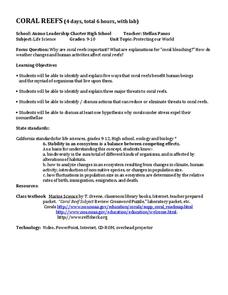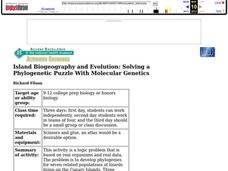Curated OER
Lesson 1 - What Are Fossils?
Students define and research fossils. In this fossil lesson, students access teacher assigned Internet sites to examine images of fossils. They determine the definition of a fossil and find out how fossils are formed. They also define a...
Curated OER
Tucson Children's Museum Electricity Word Search
In this Tucson Children's Museum Electricity worksheet, students review and discuss twenty key terms associated with electricity and circle each key term in a word search puzzle.
Curated OER
Electricity Crossword
In this electricity worksheet, students complete a crossword puzzle by figuring out the vocabulary words associated with the 20 clues given.
Curated OER
"Polly"gon Pockets
Explore polygons with your elementary learners. Divide the class in 12 to configure the polygon puzzle before them. They list the attributes of each type of polygon they see, and if there's time, they jump on the interactive website...
Curated OER
What is Water?
Young scholars examine water's properties. They participate in hands-on activities to show the properties of water.
Curated OER
Harvest the Facts
Young scholars discover heath problems caused by tobacco. In this human health instructional activity, students identify the many diseases tobacco use causes and how to prevent such diseases. Young scholars investigate the organs in...
Curated OER
Plate Tectonics: Kindergarten Lesson Plans and Activities
This unit focuses primarily on plate tectonics and plate boundaries surrounding continents. It contains pre- and post-lab sections that walk young geologists through plate movements in order to visualize what's going on inside Earth.
Curated OER
Hazards: Kindergarten Lesson Plans and Activities
The last unit in the series allows kindergarteners to see the dangers and hazards associated with each of the natural disasters learned so far in the series—earthquakes and volcanoes. They listen to sounds associated with the disasters.
Curated OER
What's Your Genus? Scientific Classification and the VT
Students learn about binomial nomenclature, the scientific system of classification. In this scientific classification lesson, students work cooperatively to complete a binomial scavenger hunt using the internet and a Visual Thesaurus....
Code.org
APIs and Using Functions with Parameters
Introduce your class to the API, a reference guide that lists and explains the functionality of programming language. Using JavaScript, individuals draw complex designs that require additional commands and parameters defined in the API...
Curated OER
Is the Hudson River Too Salty to Drink?
Learners explore reasons for varied salinity in bodies of water. In this geographical inquiry lesson, students use a variety of visual and written information including maps, data tables, and graphs, to form a hypothesis as to why the...
Curated OER
Coral Reefs
Young scholars research coral reefs and identify their benefits to humans, threats to the reef, how to reduce and eliminate threats, and more. In this coral reef lesson plan, students research the reefs, and take a field trip to an...
Curated OER
Island Biogeography and Evolution
Students use this activity as a logic problem that is based on real organisms and real data. The problem is to develop phylogenies for seven related populations of lizards living on the Canary Islands. Three phylogenetic charts are...
Curated OER
A Symphony of Decomposers
Young scholars discover decomposition. In this environmental lesson, students explore different types of decomposers and their role within the ecosystem. Young scholars also discover how waste interferes with the decomposition process.















